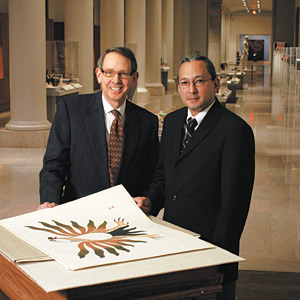| |
A community’s prosperity isn’t just limited
to its economic outlook. RBC’s vision of “building prosperity
together” also means that we pay attention to the well-being of
our communities by supporting arts, culture and athletics.
A dance to remember
If you attended The National Ballet of Canada’s production of Swan
Lake or The Firebird in 2003, you won’t soon forget the powerful
performances of one of Canada’s premier dance troupes. But imagine
how it would feel to be one of the performers. That’s the memory
young dancers and young children have from The National Ballet of Canada’s
five-city Western Tour, sponsored by RBC Investments. At every stop along
the tour, RBC and The National Ballet provided once-in-a-lifetime opportunities
for ballet students to attend a master class with stars from the troupe.
Children who attend RBC-funded after-school programs were also thrilled
to take part in movement and dance workshops led by professional dancers
from The National Ballet.
And, for the ninth year, RBC Capital Markets supported
The National Ballet’s
Kids Corps, an educational outreach
program for children.
Support for cultural cornerstones
In 2003, RBC announced its largest gifts ever to support arts and culture
in Toronto, where four of Canada’s leading cultural institutions
are based. The Art Gallery of Ontario, the Royal Ontario Museum, the
Canadian Opera Company and the National Ballet School received
a total of $4 million to invest in improvements to their facilities.
“We have much to learn from RBC,” said Hilary Weston, chair
of the Royal Ontario Museum’s fundraising campaign. “Your financial
support is proof of your foresight – and carries on RBC’s esteemed
legacy as a leader in the support of arts and culture.”
RBC’s donation was directed to these cultural cornerstones in recognition
of the important role arts and culture plays in the region’s economy
and quality of life for its residents. A brush with success
RBC Investments and the Canadian Art Foundation sponsored the fifth
annual New Canadian Painting Competition, established to recognize
visual artists in the early stages of their careers.
Over 600 artists entered the 2003 competition,
and works by the 15 finalists were displayed publicly.
The three regional winners will also have
their works showcased in RBC’s
own art collection, started in 1929 to encourage Canadian artists,
and containing works by artists such as Emily Carr, Alex Colville,
Marc-Aurèle
Fortin, Cornelius Krieghoff and Christopher Pratt. Hundreds of paintings,
prints and sculptures from our collection are displayed in RBC locations
throughout Canada and around the world.
Cross-border
art exchange
 |
|
| |
 |
Residents of Minneapolis
had a taste of Canadian art as part
of a joint venture between the Winnipeg Art Gallery and the
Minneapolis Institute of Arts.
Northern Visions:
Art and Life of the Inuit, a collection of Inuit sculptures and prints,
was exhibited at the Minneapolis Institute of Arts in 2003.
The collection, one of the largest in the world, belongs
to the Winnipeg Art Gallery.
The exhibition is the first of a series
of cultural exchanges between the two art galleries, designed to build cultural
and business connections between Minnesota and Manitoba. RBC Dain Rauscher in
Minneapolis, and RBC Investments in Winnipeg, each donated $5,000 toward the
cost of the exhibit.
Joan Grathwol Olson, director of development for the Minneapolis
Institute of Arts agrees. “The exhibition has been well
received. People here have never seen anything like it
and we are grateful to RBC for their financial contribution
and partnership.”
|
|
Sheldon Chester, an RBC Dain Rauscher
financial consultant and collector of native art looks at
prints with Joe Horse Capture (right), associate
curator at the Minneapolis Institute of Arts. In 2003, RBC
sponsored an exhibit of Inuit sculptures and prints at the
gallery, as part of a cultural exchange with the Winnipeg Art
Gallery.
IMAGE: Stan Waldhauser |
|
|
| |
|
RBC Financial Group supports arts and culture, with donations to music,
dance, theatre and the visual arts, for we believe in the power of the
arts to enrich our lives and enhance our communities. We also support amateur
athletics, from grassroots all the way to the Olympics.
Wide-ranging support
for opera
RBC has been an ongoing supporter
of opera since the 1960s, and has contributed over $2.1 million to 30 opera
associations across Canada in the last
10 years, including national support of the Canadian Opera Company’s
Ensemble Studio program. We extend a broad base of support to local opera
companies,
too, which is why RBC was named the 2003 winner of the Bravo Award for
Outstanding Corporate Support in Canada by Opera America, a non-profit
association of 170 professional opera companies across North America.
“RBC is a true leader in corporate philanthropy, recognizing the
vital role opera plays in the educational and cultural life of communities,” says
James Wright, General Director of Vancouver Opera, who nominated RBC for
the award. “We, and the millions of people that opera reaches across
the country, are grateful for their vision and leadership.”
Concert tour gives back
Since 1987, some of Canada’s most
popular performing artists, under the leadership of musician and actor
Tom Jackson, have raised their voices in song as part of the Huron
Carole, a concert series named after Canada’s first Christmas carole, composed
in 1641.
And while the music provides food for the soul, the
13-city tour also raises funds for local food banks in each of its stops.
RBC has been a sponsor of the tour since 1997.
This year, the Huron Carole raised $365,000 from ticket
sales and collected nearly 7,000 kilograms of food, with
an additional $17,830 raised through
the sale of commemorative pins at the RBC Pin Bin.
Special Olympics
RBC has supported Canadian Special Olympics since 1968. Today, employees
across Canada volunteer their time as coaches, fundraisers and organizers
with local teams while RBC-sponsored Sports Celebrities Festivals raise
more than $1 million annually for Special Olympics.
Some of our employees compete
in Special Olympics, too, and for one of them, 2003 was a banner year.
Vancouver’s Corrie Carlile earned a spot on the Canadian Special
Olympics’ National swim team, competing in the World Games in Dublin,
Ireland, where she won two gold medals. Corrie serves as an inspiration
to other athletes with disabilities. Her advice? “Be ready to
try new things, train hard, be a good sport and follow your dreams.”
An Olympic tradition
 |
|
| |
|
Olympics in the classroom
The entire world pays attention to the Olympics – and watching the
Games
on television is as close as most of us will ever get to an Olympic experience.
But for students all across Canada, the 2004 Athens Olympic Games will feel
a little closer, thanks to the Canadian Olympic Education
Program.
In 2003, RBC teamed up with the Canadian Olympic Committee
to offer this curriculum-based resource geared to students in grades four
to six. Made
available for free to over 12,000 schools across Canada, the resource
includes a
32-page kit of curriculum-based activities on topics including ancient
Greece
and a fun unit on how to stage a mini-Olympic Games. Athletes study and score
RBC celebrates the achievements of
amateur athletes both on the field and in the classroom. The annual RBC
Junior A Scholarship program rewards outstanding academic achievement,
athletic prowess and community service. Ten players, one from each of Canada’s
Junior A leagues, received $1,000 scholarships. Of these, the most outstanding
candidate was recognized with an additional $5,000 award.
Fundraising support for
sports teams
RBC’s popular Toonies for Your Team program has been helping local sports teams raise funds for uniforms, equipment
and playing space for eight years.
In 2003, events like Leo’s Shoot-Out,
The RBC Helmet Toss and the Toonie Toss (where event spectators toss a
two-dollar coin onto a target and the person
with the closest coin to the target splits the proceeds with the team)
raised
more than $100,000 for minor teams across Canada.
RBC’s Local Hockey Leaders
In 2003, RBC launched a new program
in Canada to recognize and celebrate “Local Hockey Leaders,” behind-the-scenes
individuals who inspire others through activities such as coaching teams,
shovelling outdoor rinks, organizing fundraising campaigns or driving players
to games.
Thirteen regional winners receive $5,000 each toward
a registered charity or hockey cause in their community,
special recognition in the Hockey Hall of Fame and a signed Team Canada
jersey.
Then, one national winner receives a grand prize of $25,000 for a hockey-related
cause.
Labrador Winter Games
Imagine a week-long sporting event
that brings together over 500 Innu, Inuit, Settlers and Métis
people from 18 remote communities across Newfoundland and Labrador, Canada’s
easternmost province. Now imagine there are no age barriers
in the competitions, which include
dog-sled racing, snowshoeing and the “seal crawl.” Add snow
and cold. These are what make the Labrador Winter Games unique.
The Labrador Winter Games began in 1982 as a way to
revive traditional sports that are part of the local culture, and support
athletes who are from remote areas and face obstacles such as inadequate
training facilities, the lack
of local peers with whom they can
compete, as well as the high cost of
travel to competitions.
RBC has been a key supporter of
the Labrador Winter Games since 1997.
They shoot, they score
 |
|
| |
 |
Hockey is a way of life for
millions of people across North America, from players and coaches
to officials, volunteers and spectators. RBC has been a supporter
of hockey since the 1980s, and the centrepiece of our support
is the RBC Royal Bank Cup, the National Junior A Championship.
The tournament is a great opportunity for players to showcase
their talents to Canadian and American scouts. Each year over
100 teams compete to make it to the Championships, with the final
five competing in a week-long round robin.
But visitors are treated to more than
exciting hockey. RBC kicked off the 2003 tournament, held in
Charlottetown, Prince Edward Island, with a barbeque to thank
the community, attended by 2,500 people. Friends and family of
the teams were then treated to an evening of dinner and dancing
to thank them for their support of hockey.
RBC also sponsored the 2003 IIHF World Junior Hockey Championship,
held in Nova Scotia – the first time in Canada since 1999.
It was considered to be the most important sporting event ever
to be held in that province. |
|
Communities from across Canada compete
fiercely to host the annual
RBC Royal Bank Cup, and in 2003, the tournament swept into Charlottetown,
Prince Edward Island, bringing with it thousands of spectators,
boosting the local economy and raising the national profile of
this seaside city.
IMAGE: www.lamediadesign.com |
|
|

